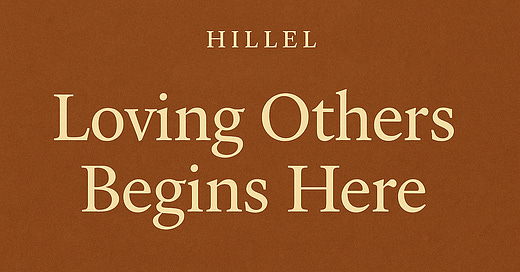If I am starving to death, how can I feed others? The answer is that I cannot. Similarly, how can I love my neighbor if I do not love myself? The roots of these questions are in the Bible:
The saying "love thy neighbor" comes from the Bible, specifically from Leviticus 19:18 and Matthew 22:39, where it is stated as a command to treat others as you would treat yourself. It's a fundamental principle of many religions and cultures, emphasizing kindness, compassion, and respect for others.
Hillel lived during the first quarter of the first century AD. He was a Jewish scholar, teacher, and expert on the Bible. He is often referred to as Hillel the Elder.
The words of Hillel the Elder have lasted for over two thousand years. They are simple on the surface, but if you take a moment to think about them, they hold deep meaning for how we live our lives. His three short questions invite us to reflect on who we are, how we treat others, and how we use the time we have been given.
He asks, "If I am not for myself, who will be for me? This is a powerful reminder that we must care for ourselves. Not in a selfish or greedy way, but in a way that honors our worth as human beings. We must learn to stand up for ourselves, to speak for our needs, to value our feelings and dreams. If we do not do that, then who will? Others may support us at times, but we cannot rely on the world to take better care of us than we take of ourselves.
But he does not stop there. He follows it with, "if I am only for myself, what am I?" This is where the wisdom becomes deeper. It is not enough to care only for ourselves. If we shut our eyes to the pain of others, if we live only for our own comfort and gain, then we lose something essential about what it means to be human. We are not made to live in isolation or to build lives that ignore those around us. If we are only for ourselves, we become smaller, less loving, and more alone.
And then comes the final question. "If not now, when?" Hillel is reminding us that time is passing. We often put off what matters. We say we will make changes tomorrow. We say we will reach out to someone later or try to be a better person someday. But life does not wait. The chance to do good, to care for ourselves and others, to take action with love and courage is now. Not next week, not next year, but right now.
All three parts of this ancient saying come together to offer a kind of map for a meaningful life. First, we take responsibility for our well-being. Then we turn outward to recognize our responsibility to others. And finally, we are urged not to delay.
I see this truth in my own life. I know how important it is to care for the people around me. That includes my daughters and their husbands and my grandson. Even though they are grown, I still feel a deep sense of love and gratitude toward them, and I want to express that love while I can. I also feel responsible for my friends, my neighbors, and the people who live with me in this independent living community. Many of us are growing older. Many of us are lonely or tired. A kind word or a gentle gesture means so much.
But I also know this. I cannot offer kindness or support to others if I do not first take care of myself. I need rest. I need peace. I need to tend to my body, mind, and heart. That is not selfish. It is necessary. Because only when we care for ourselves can we truly care for others.
That is the heart of Hillel’s teaching. Take care of yourself. Take care of others. And do it now. Because now is all we really have.
However, some people have told me that, in their opinion, Hillel was talking about being narcissistic. I always point out that narcissism has been researched, and most psychologists point to the fact that there is healthy narcissism and unhealthy narcissism. Unhealthy narcissism refers to people who have a personality called Narcissistic Personality Disorder. These people have no empathy for others, are completely selfish, and cannot have compassion for others.
Hillel is referring to healthy narcissism, and that means we must have enough self-regard to be able to be of help to others. Heinz Kohut, one of the brilliant psychologists of all time, wrote:
Kohut outlines healthy narcissism as:
Strong self-regard.
Empathy for others and recognition of their needs.
Self-respect and self-love.
Courage to accept criticism from others while maintaining positive self-regard.
Confidence to set and pursue goals and realize one's hopes and dreams.
As I have told many clients during my years of psychotherapy practice, we need a small amount of selfishness before we can give to others.







